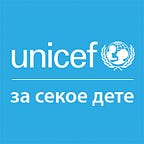A child’s migration status should never be a barrier to accessing basic services
Thousands of refugees and migrants passed through the transit centre Vinojug since it was established in June 2015. Some of them stayed a few hours, some a few days. But for a small group caught when policy changes led to border closures along the Balkan route, Vinojug became home for more than ten months. After fleeing their homes and being on the move, many had missed access to health care and other essential services. Together with partners, UNICEF has been on the ground protecting the rights and responding to needs of all children.
Nehla, a Syrian mother holds her two-month-old baby Ivan. “We wanted to go to Germany, before the borders closed. It is tough, but we have to accept the situation. Also, with all the help from the staff here, life is much more bearable.”
Meri Spasikj, UNICEF supported partner from the Association of medical nurses, technicians and midwifes gives baby Ivan a massage during a regular development check-up. Meri is one of the patronage nurses that visits the transit centre every day to support mothers of newborn babies to continue breastfeeding and monitor their child’s development.
In the mother and baby corner of the UNICEF supported child-friendly space, nurse Meri checks baby Ivan’s shoulder joints as his mother Nehla looks on. Together with weight and height measurements, the regular development examinations help Meri identify signs of development difficulties and if needed, organize access to other specialized health services.
Meri and Nehla exchange smiles as the nurse begins to dress baby Ivan after the examination. “Mothers consult us, they share all their problems with us, they trust us, we develop a strong bond…one of the most difficult parts of our work is when we have to say goodbye,” says Meri.
UNICEF’s response to the refugee and migrant crisis in the former Yugoslav Republic of Macedonia is generously supported by the Governments of Japan, Germany and the United Kingdom, the European Commission’s Humanitarian Aid and Civil Protection department (ECHO), UNICEF’s National Committees, individuals and corporate and private partners.
Between developing and publishing this story, the number of children accommodated in the Vinojug transit centre reduced to eight after families accommodated in the transit centre voluntarily returned to Greece on the 12 March 2017.
